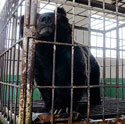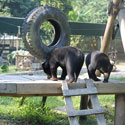 |
 |
 |
Project - Animals Asia Bear Rescue |
 |
|
Animals Asia
AnimalsAsia.org
Read the update on how the training program is progressing.
 Widespread
illegal killings, the trade in bear parts and the loss of habitat continue to threaten the survival of bears across Asia. Today, just over 400 bears are held in cramped captivity in Vietnam. The bears are kept in small cages with no access to the outside world,
adequate food and veterinary care. Their stoicism means they can survive like this for up to 30 years. Widespread
illegal killings, the trade in bear parts and the loss of habitat continue to threaten the survival of bears across Asia. Today, just over 400 bears are held in cramped captivity in Vietnam. The bears are kept in small cages with no access to the outside world,
adequate food and veterinary care. Their stoicism means they can survive like this for up to 30 years.
As a result of Animals Asia, bear bile farming was made illegal in Vietnam. Despite this, private ownership of bear is still allowed and, with minimal oversight, extraction continues. However, in 2017 Animals Asia signed a landmark agreement with the Vietnamese government to end bear farming and rescue all remaining bears held in captivity.
 Once the bears are removed from their caged environments first class veterinary care is central to improving their
welfare in the long term and ending bear farming. Winning the hearts and minds of the current and next generation of animal carers will lead to transformational change.
Once the bears are removed from their caged environments first class veterinary care is central to improving their
welfare in the long term and ending bear farming. Winning the hearts and minds of the current and next generation of animal carers will lead to transformational change.
Forix is going will cover the stipend of one Vietnamese Veterinary Intern and the cost of feeding one bears for one year at the
Vietnam Bear Rescue Center in Tam Dao, Vietnam. The training program is designed to train Vietnamese Vets to provide world-class care for animals residing at sanctuaries. Hands on training at the Vietnam Bear Rescue Center will teach them how to best care for and rehabilitate endangered bears, with the ultimate goal of staffing the new sanctuary.
All trainees learn from hands-on experience.
- Vet team: participating in health checks to learn and develop surgery and vet skills
- Bear Care team: prepare medicines and help monitor the bears
- Horticulturalist team: prepare enrichment items such as hammocks and frames to encourage the bears to exercise and socialize
- Kitchen team: prepare the bears food and medication
 The ability to have made good on their word, and rescue the remaining bears in Vietnam, marks the moment when the first Asian country successfully ends bear bile farming. The fact that this will be achieved without shaming anyone, working in partnership with the government and with the active participation of local communities, creates an important blueprint for success to share and build momentum around this issue.
The ability to have made good on their word, and rescue the remaining bears in Vietnam, marks the moment when the first Asian country successfully ends bear bile farming. The fact that this will be achieved without shaming anyone, working in partnership with the government and with the active participation of local communities, creates an important blueprint for success to share and build momentum around this issue.
|
|
|